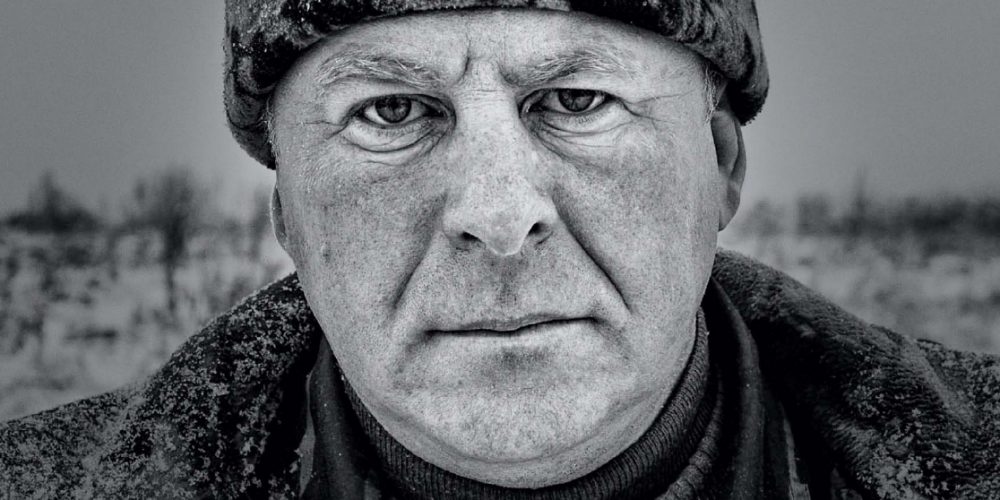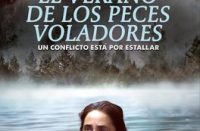Toronto has a seemingly neverending cycle of film festivals, but only Planet in Focus trains its crosshairs exclusively on environmental concerns. The 14th annual version (from November 21 to 24) featured a slate of strong, complex and curious documentaries, and another handful of very well deserved PiF award winners.
Toronto has a seemingly neverending cycle of film festivals, but only Planet in Focus trains its crosshairs exclusively on environmental concerns. The 14th annual version (from November 21 to 24) featured a slate of strong, complex and curious documentaries, and another handful of very well deserved PiF award winners. This year’s organizers also added a smart twist to the proceedings: each film was paired with a call to action to join a relevant activist organization or sign a petition related to the cause on screen. Check out the docs that A\J staffers took in below, and head to the PiF website to show your post-festival support for the issues that this year’s crop of filmmakers took on.
Jump to films: Bad Coyote | Gringo Trails | Have you seen the Arana? | Metamorphosen | Revolution | Salmon Confidential | Sand Wars | The Ghosts in Our Machine | The Last Catch
Bad Coyote
Jason Young (director), Canada: National Film Board, 2013, 53 minutes.
THE CAUSE Coyotes have moved into Cape Breton Island, belatedly replacing the wolves that were extirpated a hundred years previously. They are large, have wolf DNA and have occasionally attacked people. In 2009, a pair of coyotes fatally attacked 19-year-old Toronto musician Taylor Mitchell. The attack brought coyotes to the forefront of public attention and created a polarization of opinions within a climate of fear.
HEAVY HITTERS The story is told through five characters: an animal behaviourist, a trapper, a farmer, a Department of Natural Resources (DNR) employee and Mitchell’s mother, Emily. The island of Cape Breton’s natural beauty features prominently, as do coyotes, both dead and alive. “I’m in the coyote-killing business. The only good coyote is a dead coyote,” explains the DNR officer.
BEST SCENE Most disturbing was the footage of men piling dead coyotes in the trapper’s cabin – seemingly dozens of them – and skinning the corpses. Far more encouraging is a farmer showing his small son how to scare off a hypothetical coyote, or when Emily and the first-responder to Taylor’s mauling hike the trail and feel her presence.
WHY IT MATTERS Due to factors including habitat loss and climate change, wild animals are increasingly living in close proximity to urban and suburbanized populations that have little idea of how to co-exist with them. Misguided human behaviours such as feeding the animals, along with food scarcity, can make wildlife fearless and therefore dangerous. Additionally, the media feed on speculation and fear, enabling opinion and prejudice to trump fact and common sense.
IDEA TO STEAL Emily honours Taylor’s love of nature and the creatures that live there by seeking knowledge and understanding of the coyote so that she can forgive. Searching for truth in a difficult situation leads to better balance than simply confirming biases – it’s about pursuing information, not affirmation.
nfb.ca/film/bad_coyote | planetinfocus.org/festival-films/bad-coyote
— JK
Gringo Trails
Pegy Vail, US: Zebra Films, 2013, 78 minutes.
THE CAUSE Going to great lengths abroad to get off the beaten path of the mainstream traveller, backpackers are leaving their mark on the natural environments, cultures and economies of remote destinations they visit. The film explores questions around responsible backpacking.
HEAVY HITTERS In the centre of the Salar de Uyuni salt flats of Bolivia lies the small rock island of Incahuasi. Years ago, very few visitors were generously brought there by indigenous Incas from the area. Tourism on the island has been taken over by the government and there are now more than 300 tourists per day. Locals worry about conserving the salt flat (once a prehistoric lake) as its popularity grows. “Tourism is about selling nature and cultural heritage,” explains one of the film’s travel experts.
BEST SCENE The morning after a full moon beach party attended by thousands in Thailand, a mass of garbage some two metres thick and more than a kilometre long has collected along a coastline beach. Also strewn about are many passed out partygoers covered in paint, sand and beer cans.
WHY IT MATTERS Travel is a beautiful experience, but the world must be seen and appreciated in a sustainable way. Irresponsible tourism damages the cultural, environmental and economic landscape.
IDEA TO STEAL The Chalalan Ecolodge in Bolivia is run by the native community, which protects the fragile environment and benefits the local economy. Indigenous guides lead backpackers to the locations they desire without compromising the needs of ecosystems or wildlife.
gringotrails.com | planetinfocus.org/festival-films/gringo-trails
— YP
Have You Seen the Arana?
Sunanda Bhat (director), India: Songline Films, 2012, 73 minutes.
THE CAUSE The way of life of the Adiya, a tribal people in Wayanad, South India, is being eroded by modernization. Natural healers from the Forest Protection Group are responding to the abuse of overharvesting by tourists. A farmer tries to cultivate traditional rice without chemicals. A family buys into the curse of plantation farming. The whole is tied together through the telling of a creation myth.
HEAVY HITTERS The lush landscape is on full display, as are the people of the region and the animals that they live with. Woven through, the mythical song for the dead is sung to illustrate the linkages between the three stories. The final credits note that the villager who is recorded is one of the last people left who is able to sing this particular historical song.
BEST SCENE The family that is ruined by trying to grow commodity crops on leased land openly discusses the option of suicide, a choice that many other farmers have made. “Misery is the only balance left in our bank account,” the wife says.
WHY IT MATTERS Progress is often imposed on traditional people with no benefit to them whatsoever. One segment discusses how planting teak changed the hydrology of the area and displaced fruit-producing trees, so the animals are hungry and come into town, becoming pests. Cultures and languages are wiped out before anyone understands what is being lost. Heritage seeds and medicinal plants and traditional knowledge are priceless, not valueless, and once they are gone they are gone forever.
IDEA TO STEAL “We can make anything happen if we do it perfectly and with passion.”
songlinefilms.com | planetinfocus.org/festival-films/hysta
— JK
Metamorphosen
Sebastian Mez (director), Germany: Filmakademie Baden-Württemberg, 2013, 84 minutes.
THE CAUSE More than 40 years ago, an explosion at a clandestine nuclear facility in remote southwestern Russia contaminated the local watershed and the community that supported this strategic outpost of the Soviets’ missile weapons program. Government kept the disaster a secret through the next three decades of Cold War, treating locals as fallout guinea pigs and allowing the radiation to mutate their livelihoods and histories.
HEAVY HITTERS The abundance of bleak landscapes and the heavily weathered expressions staring deeply into the camera are stunning – together they unravel a horrible, little-known nightmare in dreamy black-and-white. In one long shot, the camera moves toward the Techa River shoreline on foot while focusing on a Geiger counter, whose reading spikes from 0.019 mR/hr to 3.297 in the space of a just a few steps.
BEST SCENE A painfully slow, lingering pan across a snow-choked thicket of birch trees as the voice of a local woman calmly recalls her experience of the 1957 explosion and its brutal aftermath. It’s a nice capture of the invisible specter that still haunts the landscape and its people.
WHY IT MATTERS The survivors of the little-known Kyshtym disaster continue to live in exile, victimized by government negligence and frozen in time by the event. Director Mez offers a belated opportunity to help the healing process by acknowledging all the damage and deception.
IDEAS TO STEAL In another scene, a man performs an impromptu dance around his car, which is parked beside a pair of crumbling buildings. With this simple act of dynamic movement, he manages to recast the disturbing atmosphere around him – a hint of the indomitable human spirit.
metamorphosen-film.com | planetinfocus.org/festival-films/metamorphosen | Read A\J’s mini review of Metamorphosen from Art & Media.
— ER
Revolution
Rob Stewart (director), Canada: D Films, 2012, 90 minutes.
THE CAUSE Climate change and the rise of carbon dioxide levels in our oceans are endangering our survival as a species on this planet. There could be no coral left in 20 to 50 years because of ocean acidification, and Revolution makes a strong plea to reverse the tide: “It’s not just about saving the oceans, it’s about saving ourselves.”
HEAVY HITTERS A wide cast of colourful characters drive the film – from lemurs to cuttlefish, and from PowerShift Canada delegates on Ottawa’s Parliament Hill to Mexican farmers protesting for the rights of Cochambamba, or Mother Earth. British economist Lord Nicholas Stern points out that our current fossil fuel dilemma has nothing to do with lack of technology or economic viability. The problem is our lack of political will to act on reducing greenhouse gas emissions.
BEST SCENE On a snow-covered mountain, a hungry Canadian lynx is filmed violently devouring a hare – a harsh metaphor for how Canada is exhausting the land in its rush to increase tar sands mining.
WHY IT MATTERS We cannot wait for governments to act; we have already been waiting for too long. During the lifespan of the oldest baobab tree, humans have consumed most of the life-sustaining resources on the planet and the population has more than doubled to seven million.
IDEAS TO STEAL “The revolution has begun and you are a part of it now,” says director Rob Stewart. “And we’re going to win.”
therevolutionmovie.com | Listen to an interview with Stewart on the A\J podcast
— YP
Salmon Confidential
Twyla Roscovich (director), Canada: Independent, 2013, 71 minutes.
THE CAUSE Wild salmon on Canada’s West Coast are a keystone species – one that creates and/or influences their environment so profoundly that the entire ecosystem and its other species depend on it. Wild salmon are under threat from diseases originating in salmon farms. Government is so intent on protecting the aquaculture industry that it is suppressing and falsifying its own scientific data and intimidating independent researchers to keep the scope of the crisis hidden from the public.
HEAVY HITTERS Director Twyla Roscovich declines to feature the landscape or wildlife other than salmon in favour of interviews and footage of researchers doing fieldwork. Some of the scenery does sneak into the film, as does footage of a rare spirit bear, but the film is about the fish and the data and the battle between independent researchers and government spokespersons. The star – front and centre – is the indefatigable Alexandra Morton, who has studied Pacific wild salmon for more than 30 years.
BEST SCENE Morton and her assistant, forbidden from testing farmed salmon for disease, see an eagle with a dead farm fish in its claws. They chase the eagle by boat and manage to retrieve enough salmon tissue for effective testing. Even better is Morton rolling out her idea for a Department of Wild Salmon, made up of all the ordinary people who live with and understand salmon – and, most importantly, they are collaborating to save it.
WHY IT MATTERS Morten says that “democracy is slipping away from us” as a result of government muzzling of science in favour of industry rather than the public interest. She says that corporate food production is a giant experiment that “is not going so well.” Allowing farmed salmon to destroy wild species will wipe out an asset of incalculable public value to support trade agreements that benefit relatively few.
IDEA TO STEAL Watch and share the film, boycott farmed salmon, stay informed, speak up and join the Department of Wild Salmon. And emulate the example Alex Morton sets: Never give up and always believe in the power of ordinary people to prevail over censorship and corruption when armed with conviction, vision and the truth.
Watch the film at salmonconfidential.ca | planetinfocus.org/festival-films/salmon-confidential
— JK
Sand Wars
Denis Delestrac (director), Canada & France: Rappi Productions, 2012, 72 minutes.
THE CAUSE Modern society depends on sand for everything from buildings to toothpaste to technology, although most people take this essential resource for granted. Our enormous demand for sand has disastrous effects, such as coastlines disappearing and underwater ecosystems being destroyed. This doc is a shocking exploration of the planet’s $7-billion-a-year sea sand dredging industry and the displacement of coastal communities by the world’s “sand mafia.”
HEAVY HITTERS One Planet in Focus programmer described Sand Wars director Denis Delestrac as France’s answer to Michael Moore. The film also features Mohamed Nasheed, former president of the island of Maldives, where extremely rapid land loss due to both coastal dredging and sea level rise have caused much suffering. And it’s not just the underprivileged who are in trouble; Californians recently spent $17.5-million on a beach restoration project that washed away within a year.
BEST SCENE On a cratered beach that resembles the face of the moon in Tangiers, Morocco, a local passionately yells at the crew – keeping eye contact beyond the camera – about his experience with the local sand mafia, which has violently taken over the beach in his community. “I am scared to talk to you now because I will be beaten or killed!” he says.
WHY IT MATTERS Earth’s natural land barrier is sand, yet depletion of the resource paired with heavy erosion is causing three quarters of the world’s beaches to retreat. With sea level rise caused by climate change already affecting coastlines, a lot more communities are at risk of intense flooding. Also, desert sand does not stick together as well as sea sand, and underwater dredging (often done illegally) kills life in the seabed by damaging ecosystems.
IDEA TO STEAL A quarter of the glass put into the world’s recycling systems ends up in landfills. As the film shows, an alternative to extracting sea sands is crushing glass found on beaches, returning it to its original material state. Similarly, straw bale houses offer a strong alternative to using cement for building residential homes.
sand-wars.com | planetinfocus.org/festival-films/sand-wars
— YP
The Ghosts in Our Machine
Liz Marshall (director), Canada: Ghosts Media Inc., 2013, 85 minutes.
THE CAUSE Deeply and culturally engrained in our modern society is the ownership and use of animals for industrial food, commodities, fashion and scientific experimentation. The film profiles photojournalist Jo-Anne McArthur’s decade-long mission to expose how each individual animal is a sentient being that deserves love and respect. McArthur and Marshall’s collaboration erases the distinction between human and non-human personalities.
HEAVY HITTERS After climbing a factory wall on an early morning assignment to photograph foxes and minx at a fur farm, McArthur shares a difficult realization. “I’m not there to liberate them. I’m there to document them. There won’t be a change in the system that causes the problem if I just liberate them. I have to educate people through my photos so it will stop.”
BEST SCENE One word: piglet. On the farm sanctuary that McArthur visits regularly to recover from disturbing photography assignments, there are some very distinct and fabulous animal personalities. Perhaps the most purely adorable is a little piglet who laps up lunch milk until falling asleep in it.
WHY IT MATTERS Historically humans have eaten animal meat, yet the film delves much deeper into the issue of how animals are being used by humans against their will as mere objects that supply our modern industrial machine. This status quo causes unfathomable physical and emotional harm.
IDEA TO STEAL The key question raised by Ghosts is: How do you change something that exists everywhere, often hidden in plain sight? While there is no simple answer to such a complex question, the film in itself provides a starting point – education.
theghostsinourmachine.com | Listen to an interview with McArthur and Marshall on the A\J podcast.
— YP
The Last Catch
Markus C. Schmidt, Germany: Lichtblick Film GmbH, 2012, 84 minutes.
THE CAUSE Unsustainable fishing of European blue fin tuna is putting the species in danger of extinction and threatening the livelihoods of fishers as tuna stocks face collapse. Mediterranean tuna yields plummeted due to overfishing of adult spawners for large markets, leaving only fish that were too small or not economically viable to catch.
HEAVY HITTERS After selling his boats, one fisherman says that if fishing had been regulated from the start, the workers wouldn’t have these problems. He argues that fishers are not the ones to blame or the “liars” they’ve been framed as, and that the wholesalers (who focus on profit, not conservation) are responsible for the unsustainable, out-of-balance situation.
BEST SCENE In a dark, local diner, a group of fishermen sit together at the bar and mourn the decline in tuna fish populations, which they realize will one day will eliminate their jobs. Or footage of the “death bed” fishing style, wherein a net full of tuna is brought up to the surface for snipers to shoot, and any fish shot in the belly equals damaged meat that the fishers must pay for.
WHY IT MATTERS The casino-style mismanagement of fish resources has a direct negative impact on the environment and local economies. Truly sustainable systems only work when interdependent economic, environmental and social concerns are balanced.
IDEA TO STEAL From a business perspective, preserving a 600-kilogram tuna at minus-60 degrees Celsius for up to three years sounds wonderful, but the film explains that this kind of over fishing is “McDonalizing” the industry. Stopping fishing during spawning season would at least allow fish to repopulate.
autlookfilms.com | planetinfocus.org/festival-films/last-catch
— YP













